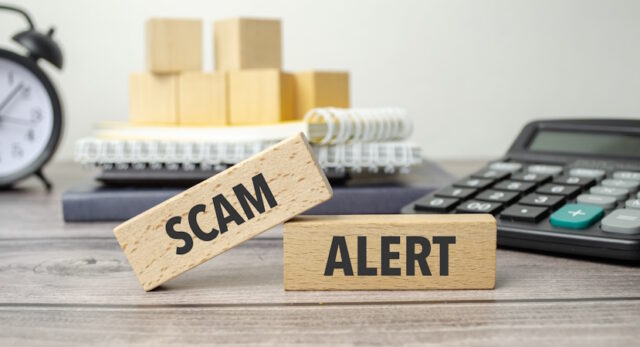
By Jeff Somers
If you’re like most people, you probably didn’t think a whole lot about tariffs before this year. And if you’re like most people, you’ve probably spent this year thinking a lot about tariffs—specifically, how they’re going to impact your life. Whether it’s worry over higher prices and empty store shelves or more generalized economic anxiety, these certainly are exciting times. And, like clockwork, we can add one more thing to worry about in relation to tariffs: Scams.
Pivoting off the chaos and uncertainty everyone is experiencing around the on-again, off-again tariffs and their constantly shifting parameters, scammers have quickly assembled a few new attacks on your bank account. They count on the fact that most of us aren’t economists or experienced with import/export law, so it can be easy to frighten or intimidate us into forking over money, especially because the one thing most of us know about tariffs is that they’re going to cost us money. Here are the tariff scams you need to be on alert for—and how to spot them.
Fake government emails
One new scam attempts to leverage people’s unfamiliarity with tariffs by posing as government agencies seeking tariff payments directly from consumers. Several hundred websites have been created since the beginning of the year, many with deceptive names including terms like “U.S. Customs” or “Tariffs” in hopes of convincing you they’re legitimate organs of the government. The scammers then send out emails from those official-looking domains claiming that you owe a tariff payment for something you bought recently, or that you owe a general tariff payment.
Sometimes the scammer’s goal is to get you to make a payment, but often it’s just to collect your information via an official-looking form.
How to spot it: First, always keep in mind that consumers don’t pay tariffs directly—if the costs are passed on to you, it’s through higher prices. Any request for a direct tariff payment is almost certainly a scam. Any official government website will have a “.gov” extension, so you should be suspicious of any “.com” or “.net” sites claiming to be associated with the government. You can also use what’s known as a WHOIS lookup to see when a web domain was registered. Any site created within the last few months should be considered extremely suspicious.
Fake messages about mail and packages
Another way scammers will try to leverage tariff confusion against you is by pretending to be a major shipping company like FedEx or UPS. They’ll send you an email claiming that you have a package being held because a tariff is owed, and direct you to a scam sight to pay to have the package released. This is a twist on an old scam, but uncertainty over who owes tariffs gives it a fresh sheen of legitimacy.
How to spot it: Simply reminding yourself that you should never pay a tariff directly is key—any request from a shipping company or the United States Post Office for a tariff-related fee is a scam, full stop. If you actually have packages coming and you’re at all uncertain of their status, always verify details separately by going to the shipper’s main website and entering tracking information there, or contacting their customer service.
Factory shopping
If you’re a consumer on a budget—and who isn’t these days—you might be excited to stumble on a social media post or email purporting to sell you stuff directly from factories in China or other countries without a tariff. They claim that the stuff is the same as name-brand clothing or other items, just without the branding, making them cheaper to offset any tariff-driven price increases. These sites are often pushed by so-called influencers on platforms like TikTok, who gush about avoiding tariff fees.
Of course, once you receive your items—assuming you actually do—they’re almost certainly counterfeit and probably pretty crappy in terms of quality. And you won’t have the benefit of the brand’s customer service to fall back on, either.
How to spot it: Anyone claiming they can circumvent tariffs is probably lying to you, and the old rule about things being too good to be true (i.e., they probably aren’t) always applies. If you see a post or video purporting to show a foreign factory selling items directly to consumers, it’s almost certainly a scam.
Continue reading – FREE
Disclaimer
Artificial Intelligence Disclosure & Legal Disclaimer
AI Content Policy.
To provide our readers with timely and comprehensive coverage, South Florida Reporter uses artificial intelligence (AI) to assist in producing certain articles and visual content.
Articles: AI may be used to assist in research, structural drafting, or data analysis. All AI-assisted text is reviewed and edited by our team to ensure accuracy and adherence to our editorial standards.
Images: Any imagery generated or significantly altered by AI is clearly marked with a disclaimer or watermark to distinguish it from traditional photography or editorial illustrations.
General Disclaimer
The information contained in South Florida Reporter is for general information purposes only.
South Florida Reporter assumes no responsibility for errors or omissions in the contents of the Service. In no event shall South Florida Reporter be liable for any special, direct, indirect, consequential, or incidental damages or any damages whatsoever, whether in an action of contract, negligence or other tort, arising out of or in connection with the use of the Service or the contents of the Service.
The Company reserves the right to make additions, deletions, or modifications to the contents of the Service at any time without prior notice. The Company does not warrant that the Service is free of viruses or other harmful components.












